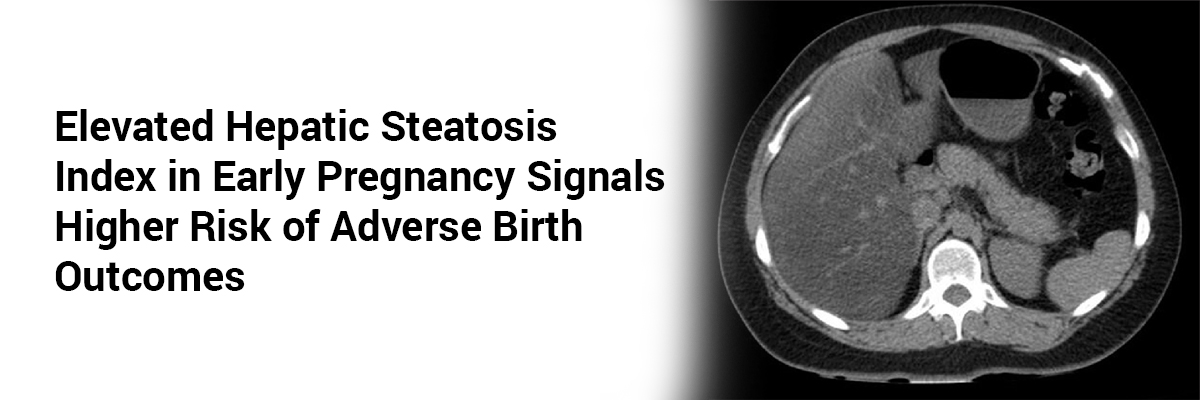
Elevated Hepatic Steatosis Index in Early Pregnancy Signals Higher Risk of Adverse Birth Outcomes
New research highlights the importance of monitoring the hepatic steatosis index (HSI) in early pregnancy as a predictive marker for adverse perinatal outcomes. Drawing on data from over 42,000 pregnant women, the study found that elevated HSI levels during the first trimester were significantly associated with increased risks of cesarean delivery, preterm birth, large-for-gestational-age (LGA) infants, and shoulder dystocia.1
The HSI, a non-invasive index calculated using liver enzyme levels and pre-pregnancy BMI, was divided into quartiles. As maternal HSI increased across these quartiles, so did the incidence of key complications. Women in the highest HSI group had 77% higher odds of cesarean delivery, 32% higher odds of preterm birth, and nearly triple the odds of delivering an LGA infant compared to those in the lowest group. The risk of shoulder dystocia also rose significantly. Notably, non-linear relationships were observed for cesarean delivery, preterm birth, and LGA, suggesting that even moderate elevations in HSI warrant attention.
Subgroup analyses revealed that the associations were particularly strong among younger women and those experiencing their first pregnancy. These findings indicate that HSI may help identify metabolic risk even in populations not typically flagged as high-risk in standard antenatal care.
The rising burden of metabolic dysfunction-associated steatotic liver disease (MASLD) among women of childbearing age adds urgency to these findings. While liver biopsy and imaging remain gold standards for diagnosing steatosis, HSI provides a practical, cost-effective alternative suitable for routine screening in pregnancy. Earlier identification of metabolic stress could support targeted interventions to reduce complications for both mother and child.
In conclusion, this study supports the incorporation of HSI into first-trimester risk assessments. By identifying women with subclinical metabolic dysfunction early, clinicians may be able to reduce the burden of adverse pregnancy outcomes and improve long-term maternal and neonatal health.
Source: Su S, Zhang E, Gao S, Zhang Y, Liu J, Xie S, Yu J, Zhao Q, Yue W, Liu R, Yin C. Associations of hepatic steatosis index in early pregnancy with pregnancy outcomes: a prospective birth cohort study. Clin Med (Lond). Epub ahead of print 2025. doi:10.1016/j.clinme.2025.100343.
akang69
akang69
slot pulsa
slot pulsa
https://chateraise.org/menu/
slot gacor
kanjeng69
https://www.seansprimedining.com/dine
slot gacor
slot demo
akang69
slot gacor
slot pulsa
slot pulsa
akang69
https://valentinesdaycountdown.com/
slot jepang
slot gacor
slot gacor
slot88
slot gacor
slot gacor
akang69
akang69
akang69
akang69
slot gacor
slot gacor
slot gacor
https://www.alpinecafeandbakery.com/menu.html
https://applebeesmenu.us/applebees-lunch-menu/
https://bakeryandsweets-fest.com/product-highlight/
https://sevenseassushi.com/menu/
slot gacor
slot777
https://freakout.club/
slot gacor
slot gacor
https://rsgm.moestopo.ac.id/instalasi-rawat-jalan/
slot gacor
slot pulsa
slot gacor
slot gacor
http://www.motohom.co.in/
slot pulsa
https://intervencion.uahurtado.cl/
slot pulsa
slot pulsa
https://www.kp2.it.maranatha.edu/
slot gacor
slot gacor
mahjong ways
slot gacor
https://azure3.test.utah.edu/
https://iceam.unimap.edu.my/
https://sindika.co.id/contact/
slot gacor
slot gacor
slot pulsa
https://jhep.unimap.edu.my/
slot gacor
Kartu Pokémon Naik Harga!! Penghobi Naik Drastis, Bermain No Limit Dapat Cuan Berlimpah
Resep Putar Hemat WD Paus di Sugar Rush, Murah Namun Ampuh!
Seseorang Terlihat Jauh Lebih Muda dari Usianya, 7 Game Big Bass Crash yang Menguntungkan
Tukang Bubur Demi Beli Honda Megapro Terbaru, Main PGSoft di Kanjeng Jadi Jutawan!
slot gacor
slot pulsa
https://portal.kaafuni.edu.gh/
https://www.thedeenshow.com/
https://elektro.trunojoyo.ac.id/
https://pgsd.trunojoyo.ac.id/
http://www.gmci.in/
https://www.medigunakhisar.com/contact/
https://www.medigunakhisar.com/category/doktorlar/
https://www.medigunakhisar.com/about/
https://www.oscarstores.com/
https://ritalabailaora.com/
https://journal.stiepertiba.ac.id/official/
https://shopifyvps.trackship.co/
https://krandeganbayan.id/
https://www.imik.edu.in/
https://www.natasshaselvaraj.com/
http://ebphtb.banjarnegarakab.go.id/
https://bigbiteonpitt.com.au/
https://sigen.kaltimprov.go.id/
http://rju.parco.gov.ba/
https://samajpragatisahayog.org/
https://bendismea.be.gov.ng/
https://mozaiktravel.id/
https://xm42newdev.wpengine.com/
https://epr.rw/
https://tribelio.page/slotpulsa
https://mhs.akpertgkfakinah.ac.id/
http://lms6.digivarsity.com/
https://ssr.vinayakamission.com/
https://prelnor.molg.go.ug/gallery/
https://englishfocus.upstegal.ac.id/
akang69
https://virtex.canadianminingexpo.com/
slot pulsa
slot bet 200
slot online
convocation.aiou.edu.pk/
https://qna.bpsaceh.com/
https://storage.therapyrooms.com/
https://www.inaexport.id/
https://vmrfdu.edu.in/
https://www.jniemann.it/
https://katalog.intanonline.com/view/
akang69
akang69
akang69
https://affordableadsgroup.com/
https://doktor.fisip.hangtuah.ac.id/
https://um.originmena.com/
https://primemarkets.com.sa/branches
https://primemarkets.com.sa/
https://www.aqtiverse.in/images/
slot gacor
https://rokomarifood.com/
https://beritrust.com/
https://dispora.sumbarprov.go.id/imgs/
slot pulsa
http://pubma.edostate.gov.ng/
https://palermo.if.ua/
akang69
slot qris
http://husc.hueuni.edu.vn/
https://www.grupogasca.com/
slot pulsa
https://ukm.stiedharmaputra-smg.ac.id/
https://ppid.mukomukokab.go.id/
slot gacor
https://s1cs.stmikroyal.ac.id/
https://terlaksana.co.id/img/
slot pulsa
https://graduation.sjctni.edu/SJCGRAD24/abc_id.php
https://admission.sjctni.edu/
https://camarabonitodeminas.mg.gov.br/oficios/
https://kmob.jabarprov.go.id/
https://ssm.school.ssmetrust.in/
https://cjnc.ppnijateng.org/
https://paisaje.age-geografia.es/
slot pulsa
hasilwin
demototo
http://majaslapa.lv/media/
slot gacor
https://sumpah.ppnijateng.org/
https://www.uniabuja.edu.ng/
https://training.super5.org/
slot pulsa
slot gacor
https://mmi.edu.pk/find-a-doctor/
https://lonsuit.unismuhluwuk.ac.id/
slot pulsa
slot gacor
https://taxicarudaipur.com/
slot pulsa
slot gacor
slot gacor
slot gacor
slot pulsa
https://siraberu.mixh.jp/
slot gacor
slot pulsa
slot gacor
https://hkg.methodist.org.hk/
slot gacor
https://www.asopa.org/
https://fisip.unismuhluwuk.ac.id/
slot gacor
https://www.panganku.org/id-ID/semua_nutrisi
https://ejurnal.ikippgribojonegoro.ac.id/
slot gacor
https://katalog.intanonline.com/view/
https://stikesgrahaedukasi.ac.id/
https://kec.slogohimo.wonogirikab.go.id/
https://www.facesulavirtual.net/efaces/
https://www.gratisongkir.id/
https://bukupdpi.klikpdpi.com/
https://ilp.mizoram.gov.in/
https://www.campdoha.org/
slot gacor
slot gacor
https://katalog.intanonline.com/
slot gacor
https://munabarat.go.id/index.php
https://youtube.klikpdpi.com/
https://katalog.intanonline.com/lazada.IM.im-msgbox
https://understandquran.com/
https://youtube.klikpdpi.com/
https://gratisongkir.id/console/
https://gratisongkir.id/vagrant/
https://www.gratisongkir.id/uploads/
https://www.gratisongkir.id/assets/
https://snyderfamilyband.com/
https://handholding.mizoram.gov.in/
https://dconline.mizoram.gov.in/
https://siva.umkendari.ac.id/
https://www.gthlcanada.com/
https://www.gratisongkir.id/assets/
https://www.vidyasthalilawcollege.com/
togel toto
slot gacor
https://www.facesulavirtual.net/
hasilwin
https://amertamedia.co.id/
https://www.gulfstarsauto.com/
https://aptika.id/
https://www.bytestechnolab.com/
slot gacor
slot deposit 10k
slot singapore
slot thailand
AKANG69
AKANG69
https://snyderfamilyband.com/
slot gacor
https://epaper.notunshomoy.com/
https://development.upr.ac.id/
https://fornas.kebijakankesehatanindonesia.net/
slot gacor
slot pulsa
https://e-anatolh.com/
slot gacor
slot thailand
slot pulsa
kanjeng69
https://loudhelp.com/
slot thailand
https://ipss-addis.org/
slot gacor
https://engineering.upstegal.ac.id/
slot gacor
https://sipaksi.unpak.ac.id/
https://pbi.teknik.unmuha.ac.id/
https://bkd.inkhas.ac.id/files/
https://barcode.akbidyahmi.ac.id/
https://sdcirebonislamic.cerdig.com/
https://tilganga.org/
https://siperjaka.ms-langsa.go.id/
slot pulsa
https://dinsos.bekasikab.go.id/
https://stkq.alhikamdepok.ac.id/
http://fmipa.upr.ac.id/
https://beasiswaperintis.id/
slot pulsa
slot pulsa
https://www.thebestflushingtoilet.com/
https://sdiassalaftahfidzulquran.cerdig.com/
https://sv-388.asia/
https://lppm.upr.ac.id/
https://peraturan.upr.ac.id/
https://simpeg-tb.id/
https://contentacademy.id/
https://ws-168.org/
slot pulsa
https://simpeg-tb.id/
https://www.lagrangepointsbrussels.com/
https://admisi.uinsaid.ac.id/img/
slot gatot kaca
https://www.multimarcasgrupovianorte.com.br/
https://silajara.kepulauanselayarkab.go.id/
slot pulsa
https://bapenda.batubarakab.go.id/run/
https://dosen.billfath.ac.id/sites/
gatot kaca slot
http://sibkd.semarangkab.go.id/ekgb/temp/
http://jak.faperta.unand.ac.id/sites/
slot pulsa
slot kamboja
https://dinsos.bekasikab.go.id/yasha/
http://agribisnis.faperta.unand.ac.id/
https://hondayogyakarta.id/
http://jak.faperta.unand.ac.id/sites/
https://dinsos.bekasikab.go.id/hunt/
https://dinsos.bekasikab.go.id/dagger/
http://tanah.faperta.unand.ac.id/potion/
https://dinsos.bekasikab.go.id/dagon/
https://dinsos.bekasikab.go.id/potion/
https://tourism.lgu-santol.gov.ph/
https://fdik.uinmataram.ac.id/rune/
https://v2.poltekpelni.ac.id/fiend/
https://simbada.kalbarprov.go.id/
https://slotpulsa2025.net/
https://slotindosat.net/
https://www.scootersforknee.com/
http://sibkd.semarangkab.go.id/sib/excel/
https://www.worldminner.com/
slot gacor
https://literate.nusaputra.ac.id/lib/
https://potomacofficersclub.com/wp-content/cache/
https://literate.nusaputra.ac.id/docs/
https://literate.nusaputra.ac.id/api/
https://www.idecesar.gov.co/images/
http://sim-epk.poltekkes-medan.ac.id/
http://sibkd.semarangkab.go.id/kartukorpri/pages/
http://sibkd.semarangkab.go.id/kartukorpri/pages/
https://buycapybara.com/
https://desasungaibuluhungar.id/
https://pgmi.unupurwokerto.ac.id/slotzeus/
https://pgmi.unupurwokerto.ac.id/slotthailand/
slot dana
https://admissions.kmtc.ac.ke/
https://permana.upstegal.ac.id/run/
https://permana.upstegal.ac.id/pages/run/
https://stkq2.alhikamdepok.ac.id/
slot pulsa
https://www.allnursejobdescriptions.com/
https://mbkm.uim.ac.id/wp-includes/images/
https://tinjukosimaling.baritotimurkab.go.id/
https://www.silenteye.org/
slot pulsa
https://upscpdf.com/img/
https://keusatker.badilag.net/file_import/
https://bisnis.poltekkesdepkes-sby.ac.id/wp-content/
Slot Bca
Slot Qris
Scatter Hitam
Slot Thailand
Slot Qris
Slot Thailand
Slot gacor
Slot pulsa
Slot zeus
Slot zeus
https://bisnis.poltekkesdepkes-sby.ac.id/wp-content/
https://gresikunited.com/run/
slot gacor
https://pusppm.poltekkesdepkes-sby.ac.id/file/
https://gameplayterbaru.com/
deposit pulsa indosat
https://jdih.tubankab.go.id/js/
https://jdih.tubankab.go.id/library/
https://jdih.tubankab.go.id/img/
https://jdih.tubankab.go.id/gallery/
slot thailand
https://epanel.cblu.ac.in/-/
http://bjkang14.postech.ac.kr/wordpress/
http://bjkang14.postech.ac.kr/wp-includes/assets/
http://bjkang14.postech.ac.kr/wp-includes/images/
https://arktisdesign.com/
https://www.allnursejobdescriptions.com/
https://ziare-online.com/
slot gacor
https://e-jazirah.com/
slot qris
https://www.ultimatepethub.com/
https://slotovo2025.com/
https://www.mobeyday.com/
https://staipati.ac.id/
scatter hitam
slot thailand
scatter hitam
akang69
akang69
akang69
slot qris
slot dana
mahjong ways 3
mahjong wins 3
https://assignmenthacks.com/
Slot Pulsa
Slot pulsa
Slot pulsa
https://acehpos.id/
https://archerysportsindia.com/
https://mrsavnpolytechnic.com/
https://nandanavanamorganics.com/
https://leeupvcsolutions.com/
https://lelaskinclinic.com/
slot thailand
https://thebharatschool.com/
https://mealsandmilemarkers.com/
https://ecustomssecure.com/
https://wallstreetenglish.edu.mm/
https://audio-constructor.com/
https://www.pulsaaxis.net/
https://www.akangseru.com/
https://ukrainemarriageguide.com/
akang69
https://www.akangseru.com/
https://catalinaislandbrewhouse.com/
slot shopeepay
slot shopeepay
10 situs togel
https://captionstore.com/
https://gettranslate.org/
https://terrariumtvultimate.com/
https://www.pryorok.com/
https://saralgyaan.com/
https://ginghameats.com/
slot shopeepay
https://gettranslate.org/
https://captionstore.com
https://enjoyislamabad.com
https://waveites.com
https://voicenusantara.id/
https://mmabreakdown.com/
https://bobmccoyart.com/
https://perpusdajawatengah.id/
https://ziggyoficialbr.com/
slot pulsa
https://linkr.bio/akang69/
https://dev.cfar.org/
https://saveursdailleurs.net/
https://joy.link/akang69
https://ponpesmodernal-imantebelian.ponpes.id/sites/
http://themockingbirdkc.com
http://akang699.kesug.com/
http://akang69.rf.gd/
https://www.ongrace.com/
https://my-home-zen-spa.com/
https://cebofil.org/
http://ironwooddesignstudio.com
https://cebofil.org/
https://pulsa-akang69.tumblr.com/
https://bandar-akang69.tumblr.com/
https://akang69daftar.tumblr.com/
https://sikelor.parigimoutongkab.go.id/vendor/agen-pulsa/
https://www.deviantart.com/slot-gacor-akang69/about
https://www.yuswohady.com/
https://indonesiaindustryoutlook.com/
https://bikeindex.org/users/akang69
https://rivielle.com/
https://issuu.com/akang69
https://heylink.me/akang69z
https://graphicography.id/slotbca/
http://oyannews.com/az/slotdemo/
https://www.laser-travel.com.np/
https://sim-epk.poltekkesjogja.ac.id/slotpulsa/
https://uddoktahoi.com/
http://www.lightcodes.net/
https://wave-gate.lightcodes.net/
https://pohwates-bjn.desa.id/slotdepo/
https://zabava.bluespot.hr/
https://bluespot.hr/
https://www.thethingsnetwork.org/u/akang69/
https://bikeindex.org/users/akang69/
https://www.masterassignment.com/
https://getyourexamdone.com/
https://www.penzion-miromar.cz/
https://sardogs.net/
https://king-lbent.com/
https://lamstyle.com/
https://pulsaindosat.us.com/
https://pulsaindosat.eu.com/
https://pulsaindosat.uk.com/
https://tamilmv.ws/
https://slotindosatt.com/













Please login to comment on this article